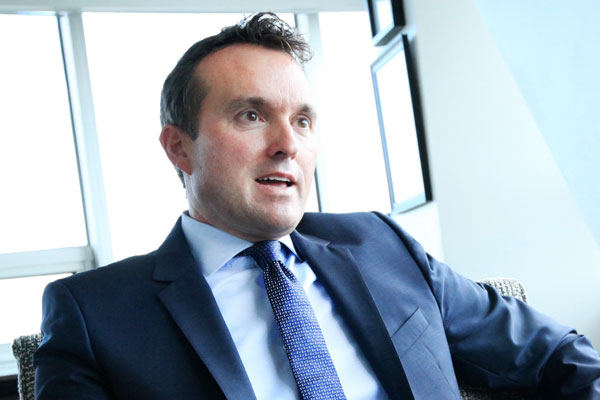Aerospace Industries Association head charts own course
Aerospace Industries Association head charts own course
- October 26, 2018 |
-
 Walt Williams
Walt Williams

Former secretary of the Army is new to association leadership but determined to make impact at $18 million-revenue group
 Fanning
Fanning
Photo: James Cullum
Eric Fanning's office at the Aerospace Industries Association is decorated with memorabilia from his long career as a civilian leader for the U.S. military. On one shelf sits a display of challenge coins, which have their origins as rewards that commanders gave soldiers when they successfully completed challenges.
"I actually gave one to this World War II vet when I was secretary of the Army," Fanning told CEO Update during an interview at AIA's offices in Arlington, Va. "We were at a Padres game … and he was throwing out the first pitch. He gets my coin and was very enthusiastic about it, and goes, ‘This looks just like the one the president gave me.'
"I was like ‘Give mine back because that one beats everybody's coin,'" Fanning joked.
As AIA's top executive, Fanning's challenge will be guiding the $18 million-revenue association into the future. He became CEO on Jan. 1, succeeding retired U.S. Army Lt. Gen. David Melcher, who held the position for less than three years.
Fanning, 50, has never run an association before but has considerable leadership experience within the federal government. In addition to being secretary of the Army under President Barack Obama, the CEO was chief of staff to the secretary of defense, acting secretary and undersecretary of the U.S. Air Force and deputy undersecretary and deputy chief management officer of the U.S. Navy.
That experience is what helped Fanning land his current job. AIA's members include major aerospace manufacturers who rely on government contracts for a large part of their businesses. And while the CEO said he has reached out to other association leaders for advice about how to run a nonprofit organization, he is determined to chart his own course at AIA.
"I don't think I get hired for something to keep it on the same path it's been on," Fanning said. "I want to bring some of my own ideas to this after getting to understand how the association is organized."
A life of service
Fanning grew up in Michigan and spent his high school junior and senior years in Ohio. When he graduated in 1986, the CEO moved to New Hampshire to enroll in Dartmouth College, where he planned to major in art to become an architect. His interest shifted to politics after presidential candidates descended on the state in 1988 to participate in the nation's earliest primary.
"It was the end of the Reagan administration so it was open primaries on both sides," Fanning said. "It seemed like you couldn't get to breakfast in the morning without running into a presidential candidate."
Fanning switched his major to history and interned for former Sen. Bob Graham (D-Fla.) and former Rep. Bob McEwen (R-Ohio), in part to see the political process from both sides of the aisle. He would spend his political career working for Democrats. One of his first positions was as a staffer on the House Armed Services Committee, beginning his long relationship with the U.S. military.
The CEO comes from a family with close military ties. Two uncles were West Point graduates while a third uncle was a career Air Force serviceman. However, as an openly gay man, Fanning wouldn't have been allowed to serve until his early 40s, when the military lifted its ban on gay and lesbian service personnel. He instead focused on civilian leadership and made history in 2016 when, as Army secretary, he became the first openly gay person to lead a military branch.
Fanning said he never faced open discrimination from the military because of his sexual orientation: "In many ways, I felt like it benefited my career because being first exposes you to a lot of people who want to show support."
Fanning took a year off after stepping down as Army secretary in early 2017 when Donald Trump became president. Later that year Melcher announced his departure from AIA, and Fanning got a call from someone he knew at aerospace manufacturer Boeing about the job.
"I hadn't aspired to run an association," Fanning said. "But this is an industry that is important to me and (AIA) would allow me to stay in this world and learn it from a different perspective, so it was immediately an attractive idea."
Avoiding change for change's sake
The top legislative priority for AIA is federal defense and aerospace funding. Several of AIA's members already have considerable lobbying operations in Washington, D.C, to advocate for spending, but Fanning said what his association brings to the table is a single voice for the industry.
"When an industry comes together, it is more powerful than all of them doing it separately,"
he said.
Fanning has spent his first few months at AIA reshaping the group's leadership team, hiring a new congressional lobbyist and communications chief. But the CEO has avoided the large-scale reorganizations that some association leaders undertake during their freshman years.
One of the biggest changes so far is a tradition the CEO brought with him from his time in government. Every Monday the association's roughly 50 staff gather for a meeting to talk about the week ahead and discuss ways to collaborate.
"I want to take an assessment of the team I got, try to work with what I got and give people an opportunity," Fanning said. "It's my job to figure out what I want to do and be clear about that, then give people the opportunity to be part of that and contribute."
